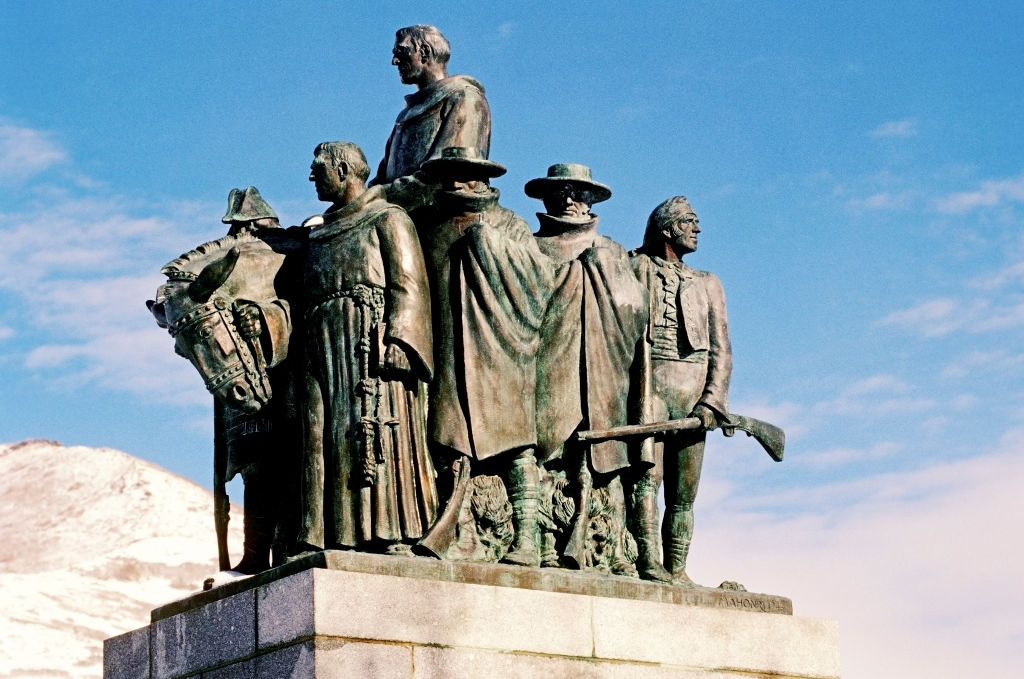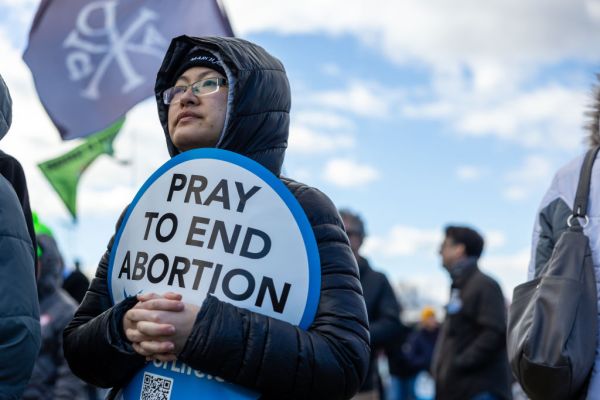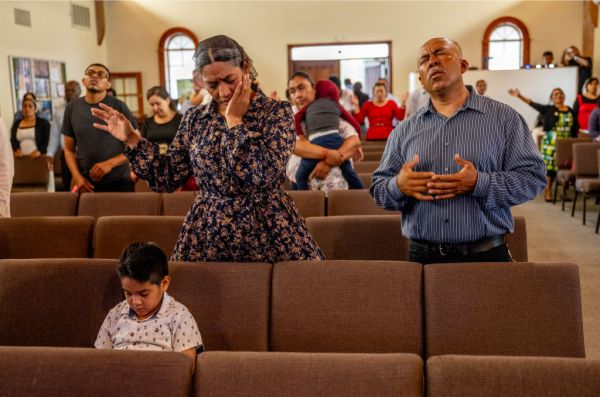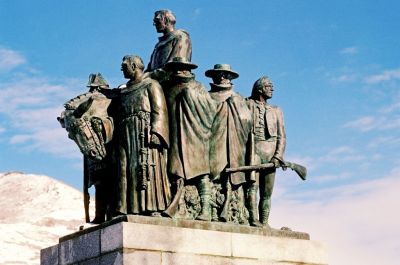Every American should celebrate Pioneer Day. Most, I gather, have never heard of it. Consider this your invitation.
On July 24, while much of the country passes a regular Wednesday, we Utahns will take the day off. Some will celebrate much like they do on the other, more well-known July holiday: parades, barbecues, fireworks. Others will find ways to honor or remember the first Latter-day Saint pioneers who entered the Salt Lake Valley on that date in 1847. I prefer to celebrate my ancestors, and I’d invite you to do the same.
More specifically, my—and your—immigrant ancestors. I spent last July 24 in Liverpool, England, considering my great-great-great-great-great grandparents, who pushed off from a dock there and set out for the New World. The year prior, I cycled up Emigration Canyon above Salt Lake City, where pioneers entered the valley, and passed the place where my fourth-great-grandmother took her last breath. She died in a wagon, a half-day’s journey from her destination. “I want to go to Zion while my children are small,” she said moments before passing, “so they can be raised in the Gospel of Christ.”
My ancestors were much like most other pioneers celebrated on this holiday. Many came from England or the eastern United States. They joined the fledgling Church of Jesus Christ of Latter-day Saints shortly after Joseph Smith declared himself a prophet and brought forth new scripture, the Book of Mormon. Most stuck around even after Smith was killed in 1844 and the Saints, then under the direction of Brigham Young, marched West. And some were there, on that July day in 1847, when the first company entered a barren valley and declared the desert their Zion.
To me, the ethos of Pioneer Day is not just remembrance, but consequence. What would the pioneers have us learn today, nearly two centuries later? What lessons stem from their struggle? What was it they believed that caused them to sacrifice so much?
Latter-day Saint thinkers have come to a number of conclusions. Some point to their grit. (Utah’s official motto is “industry.”) Others point to their dogged defense of religious liberty. Others view them as master city-builders or spiritual giants. I think these, and others, are valid. But above all else, Pioneer Day, to me, is a celebration of immigration.
Latter-day Saint theology is a theology of immigration. To Latter-day Saints, the goal of mortality, in the broadest sense, is progression: improving and becoming pure through Christ, and eventually progressing to live with God again. But the Latter-day Saint faith is an incredibly tangible one. God is a corporeal being. The temporal body is divine and essential for spiritual progression. Physical labor is deemed divine. Thus, not only is a spiritual migration—from a heavenly preexistence to temporal life to the hereafter—our theology; so is physical migration.
The idea of “gathering” is central to this ethos. In order to perform some of the rituals and ordinances necessary for salvation, per Latter-day Saint belief, believers must live in close proximity. This closeness is both practical and spiritual: We attain salvation individually, Latter-day Saint prophets have taught, but we are exalted—or reach the highest level of celestial glory—communally.
Thus, migration became an important part of early Latter-day Saint teaching. Within a year of the church’s founding in 1830, Smith—in accordance with a revelation given to him by God—sent out missionaries to “gather [the] elect from the four quarters of the earth” and bring them to Zion, or the gathering place (then in Ohio). In 1831, Smith was again told by revelation to gather people “of every nation.” In 1832, he learned that he must “gather the tribes of Israel.” The message was clear: The missionary program needed to expand beyond North America. International migration would become a central tenet of the fledgling faith.
This idea was supported by early Latter-day Saint scripture. In the Book of Mormon, a prophet named Lehi, living on the American continent 600 years prior to the birth of Christ, prophesied that it would become “a land of promise” and “of liberty,” and any immigration to it would be guided by God: “... there shall none come into this land save they shall be brought by the hand of the Lord.”
In 1837, Smith sent missionaries to the British Isles; beginning in 1840, waves of Latter-day Saints began pouring across the Atlantic. The Latter-day Saint missionaries taught salvation and migration hand-in-hand: In order to learn from the mouth of a holy prophet and gather in communion in the New Jerusalem, prospective converts must be baptized and migrate to the New World. In short order, the Latter-day Saint migration operation became a well-oiled machine. An office organizing travel logistics was established in Britain. The Perpetual Emigrating Fund was created to offer loans for impoverished travelers (who would then work to pay off their debts upon their arrival to Zion). Missionaries, sent from the United States, would serve as travel agents on their return journeys across the Atlantic, overseeing boatloads of migrants.
The operation became “the only successful, privately organized emigration system of the period,” as historian W.S. Shepperson wrote. By 1890, more than 85,000 European Latter-day Saints migrated to the U.S., forming “the most successful example of regulated immigration in United States history,” wrote historian Katharine Coman. Meanwhile, the Latter-day Saints in the U.S.— at that time in Missouri and Illinois—were driven from their homes and forced to trek West, into the unsettled Mexican land in the Great Basin. At once, there were two major migratory forces building up the Latter-day Saint movement: Europeans coming to what they believed to be a land of promise, and Americans disillusioned by their country forcing them out.
When the Bible speaks of the mandate to care for immigrants, in most cases, its authors use one of two motivations: empathy and charity. In the Old Testament, the Israelites’ command to care for the stranger is borne of an empathetic recognition that they, not too long prior, were immigrants themselves. “Thou shalt not vex a stranger … for ye were strangers in the land of Egypt.” “... Thou shalt love (the stranger) as thyself; for ye were strangers in the land of Egypt.” “Love ye therefore the stranger: for ye were strangers in the land of Egypt.” Even when Levitical law parses out the rights of citizenship, it notes that immigrants were to be on equal standing as the natural-born. Why? “For ye were strangers in the land of Egypt.”
In the New Testament, that communal memory is replaced by a charitable mandate to love all, regardless of one’s personal or ancestral ability to empathize. No longer is there an explicit heritage stemming from the children of Israel; instead, all are children of God and redeemed through Christ, and are thus mandated to care for their brother. To the hungered and naked, we are to give food and raiment. The strangers and foreigners become fellow citizens in Christ. Entertain strangers, because you might be hosting angels.
For Latter-day Saints, who believe theirs to be a restoration of the covenant God made with Adam, Abraham, and Jacob, the view of immigrants resembles both Old and New Testament theology. Church leaders have recently taught the importance of extending Christlike charity to refugees and immigrants in our communities and around the world. But those leaders echo the voice of Jehovah, declaring that Latter-day Saints were also strangers relatively recently. “Their story is our story,” said one Latter-day Saint apostle, “not that many years ago.” More so than any other Christian group, Latter-day Saint theology reflects this Old Testament mandate to remember the captivity of their fathers.
But it is a much more recent history the Latter-day Saints remember—not the captivity of Israelites in Egypt. When 1840s Latter-day Saints were issued an extermination order in Missouri, forced out of Illinois, and sent trekking across the Great Plains, they viewed themselves as a modern Israelite band. Young, their leader, framed their exile as a spiritual exodus, similar to the Children of Israel. At once Young became a sort of modern Moses; he taught his followers that their journeys were evidence that they were God’s chosen people, called to restore His covenant with the world. Immigration was the central aspect of this: Their migratory treks were evidence not of misfortune, but of God’s favor.
That idea is still prevalent, albeit more subtly, in the Latter-day Saint worldview. The institutional church is active in aiding with refugee and migrant crises around the world. U.S. Latter-day Saints, though politically conservative in the aggregate, are often among the most pro-immigrant religious groups. When President Donald Trump implemented his so-called “Muslim bans” in 2017, Latter-day Saint Republicans were among the first to express concern. The past two Utah governors—both Republican, both Latter-day Saints—asked the respective White Houses for more refugees when other GOP governors were fearmongering.
Why? Perhaps they, like me, remember the captivity of our fathers, and see ourselves in the plight of migrants around the world. Perhaps they have stories like that of my fourth-great-grandfather, Richard Pay, a shoe cobbler in Dover, England, who learned of a new American faith at age 28. At 29, he became a widower; in his early 30s, he remarried and sailed to Boston. In Iowa, during the cross-country trek to Utah, his wife gave birth to a child; in Nebraska, the infant died. The grief-stricken mother soon followed, passing away in Wyoming. Pay buried her in an icy, shallow grave, scooped up his other children, and kept marching. Now, the intermountain West is dotted with hundreds of his descendants.
Today, I believe, there are many Richard Pays, and they are still coming to America. “For ye were strangers.”






Please note that we at The Dispatch hold ourselves, our work, and our commenters to a higher standard than other places on the internet. We welcome comments that foster genuine debate or discussion—including comments critical of us or our work—but responses that include ad hominem attacks on fellow Dispatch members or are intended to stoke fear and anger may be moderated.
With your membership, you only have the ability to comment on The Morning Dispatch articles. Consider upgrading to join the conversation everywhere.